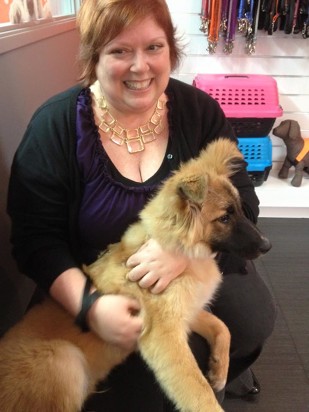"I Have Asthma, Can I Still Have A Dog?"
A few years ago, I had the worst asthma episode of my life. After several hours in the emergency room I was given a referral to see an asthma and allergy specialist, one of the best in country. During our first visit he asked lots of questions about possible triggers at home, and I mentioned I just adopted a dog. His response was quick and decisive, “Well, there you go. You had this attack because you have a new dog. Get rid of the dog.” I'm a dog lover, but I also have asthma and allergies.
Can I still have a dog if I have asthma?
Gasp! I was stunned... I loved my newly adopted dog! I started to list all of the reasons why having a dog was actually good for me; unconditional love and companionship, walking him several times a day was a good exercise for my lungs, socializing with other dog owners is good for my mental health, and on and on. I insisted that my 4-legged buddy did not trigger my asthma, after all, I grew up with dogs and worked a part-time job as a dog sitter, so there was no way it was the dog. No way.
So, what do you do when your health care provider makes a quick assumption and suggests you remove your beloved pet from your home?
Some tips to ensure you can have your dog in spite of asthma
Here are a few tips for dog lovers with asthma:
Ask for allergy testing
60% of those with asthma are triggered by allergies. If you’re one of them, finding out exactly what you are allergic to will help you develop a plan to reduce and avoid the things that worsen your asthma. You may find out you’re not actually allergic to your own pets!
Understand the allergy
So, allergy testing says you’re allergic to your pet, but what does that mean? The protein in your pet’s saliva and dander (the dead skin that flakes off your dog or cat) causes the allergic reaction. Some breeds of dog claim to be “hypoallergenic” because they shed less than other breeds or because their coat is different. Unfortunately, this is a myth. All dogs and cats will produce saliva and dander.
Keep it clean
Keeping your home as free from dander, fur and feathers as possible will help reduce symptoms. Vacuum a minimum of twice a week, preferably using a HEPA filter in your vacuum. Try not to sweep, sweeping lets the dander and fur fly into the air and resettle around the home. Mop often, and damp dust or use microfiber cloths that will hold the dust in the cloth and keep it from getting airborne. Keep clothing and linens in closed closets or drawers.
Reduce your contact with the pet
I know, cuddling and sleeping with your dog or cat is serious bonding time, but keeping your bedroom pet-free is a good strategy to reduce your allergens. If your pet does go into the bedroom, try to keep him off your bed. Wash your bed linens in hot water once a week. If possible, have a loved one or professional groomer brush your pet often and wash them once a month to reduce dander. Wash your hands immediately after petting or playing with your pet.
Discuss allergy medications and immunotherapy with your doctor
Keeping your allergies well-controlled will also help keep your asthma well controlled. Immunotherapy, or allergy shots, actually help stop the allergic reaction from happening. Allergy shots require a financial and serious time commitment. Shots are administered once to twice a week in your allergist's office over several years and may require an insurance co-payment for each doctor visit/injection. After you receive the injection you need to stay at the doctor’s for 30 minutes to make sure you don’t have an anaphylactic reaction. You may find your symptoms reduce quickly, but it normally takes up to 12 months of shots before you feel the effects.
PS: Turns out I was allergic to my dog
 After a long discussion of the pros and cons of owning a dog, I told my doctor the pros outweighed the cons, he was staying. I started allergy shots and found the right medication to manage my allergies and asthma, and both have improved dramatically.
After a long discussion of the pros and cons of owning a dog, I told my doctor the pros outweighed the cons, he was staying. I started allergy shots and found the right medication to manage my allergies and asthma, and both have improved dramatically.
How about you? How do you manage being a dog lover and keeping your asthma and allergies under control?

Join the conversation